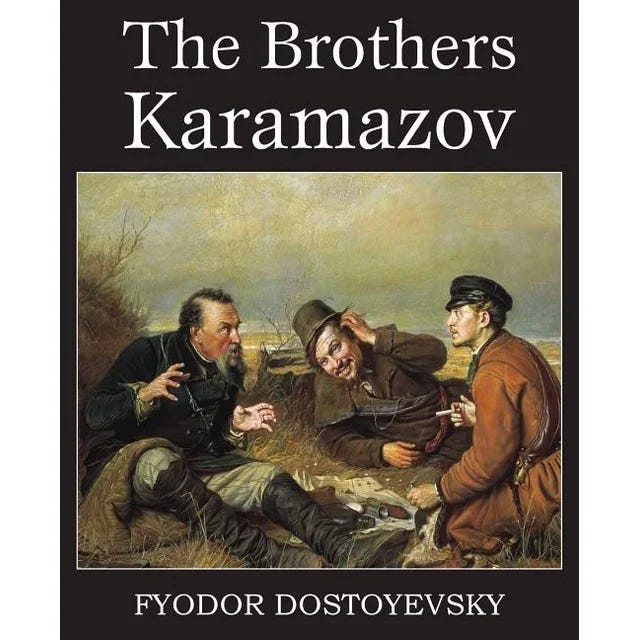Useful fictions?
In Dostoyevsky's The Brothers Karamazov, two of the brothers, Dmitri (also called Mitya) and Alexei (Alyosha), are discussing the existence of God. Dmitri has been listening to a young man who professes to be an atheist, and has been impressed. “Rakitin explained it all to me yesterday, brother, and it simply bowled me over,” Dmitri says. Yet one thing bothered him. "What will become of men then, without God and immortal life?” he had asked Rakitin. “All things are lawful then; they can do what they like?" Rakitin laughed this off. "A clever man can do what he likes," he said.
Dmitri (or Dostoevsky) was hardly the first or last person to think that God was necessary to regulate human behavior. Benjamin Franklin gave money to all the congregations in Philadelphia. He didn’t believe their doctrines, being deistically minded, but he thought religion conduced to civic virtue. Believers thought God was keeping score on them and would punish bad actions.
Believers, of course, believe in God for his own sake. Yet even unbelievers have often considered him to be a useful fiction. Human life is full of such constructs: things that might be true but even if not true are useful.
Do we have free will? Most of us feel that we are masters of our own behavior, at least within limits. Yet when one starts thinking of the properties of chemistry and physics that underlie human behavior, it's hard to avoid the conclusion that we do what our atoms dictate. “It’s chemistry, brother, chemistry!" was how Dmitri put it, paraphrasing Rakitin, who dismissed free will along with God. "You must make way for chemistry."
Yet even if there is no such thing as free will, it's a useful concept for managing human behavior. Indeed, without the concept we could hardly do anything. I certainly feel as though I can decide whether to have orange juice or tomato juice for breakfast. If I didn't act on that feeling, I could easily become paralyzed, unable to choose anything.
We form expectations of other people based on the premise that they have free will. If someone treats me kindly, I think well of that person. If someone treats me badly, I think he’s a jerk. Both conclusions would be unfounded if he had no free will and were merely acting in a way that was dictated by physical forces.
We hold people to account on the premise that they have free will. Mental impairment is an extenuating circumstance for people charged with crimes, but others have to take ownership of their actions. Our system of justice would fall apart if claims that my atoms made me do it, or my genes made me do it, or my upbringing made me do it were generally accepted.
There are, of course, people who think that such claims should be generally accepted, or accepted much more often than they are. Some go so far as to advocate the abolition of prisons entirely, on grounds that most inmates were not really responsible for the actions that landed them there. They were brought up badly; they were damaged in the womb by their mothers' drinking; their fathers beat them; their woeful job prospects made crime their only option.
All of this might be true. But it might not be. And it's not very useful. Besides, it flies in the face of human experience, or perhaps merely our perception of human experience, namely that people do make choices. San Francisco recently experienced a rash of organized shoplifting after it became clear that the authorities would not prosecute such crimes. People respond to incentives; change the incentives and people change their behavior. The history we bring to a moment might influence our actions, but it doesn't feel as though it dictates them. When I get hungry I get irritable. I find it harder to be patient and polite. But only harder, not impossible.
It's hard to imagine a definitive test of the existence of free will. It’s not impossible that our understanding of chemistry and physics will become sufficiently thorough as to render free so improbable that people will simply drop the idea. But that seems a stretch.
As to a test of the existence of God, many believers think this comes at the moment of an individual's death. So far the results of all such tests as have been conducted since humans started dying haven't filtered back to the living in a way that convinces skeptics. Conceivably God could one day tear aside the veil separating death from life. But he hasn’t yet seen fit to do so.
So believers can believe and disbelievers not. Does the difference truly make a difference in the way people live? Are the useful fictions, if fictions they are, genuinely useful? Do atheists behave worse than believers? Was Ben Franklin's investment sound?
There's not much evidence that atheists are worse citizens than theists. During the Cold War Americans attributed much of communism's malignity to its "godlessness," but far more wars in history have been fought in the name of religion than in the name of atheism. Disbelievers in free will have rarely been observed running amok and screaming, "My résumé made me do it!"
Maybe the usefulness of the fictions lies less in sociology than in psychology. Perhaps they are essentially placebos. If I believe God forgives my sins, I feel a sense of relief, whether or not God actually exists and is forgiving. If I believe I choose my actions, I feel a sense of empowerment, even if that sense is bogus.
Rakitin would sneer; Franklin might wish he’d saved his money. But in a worrisome world, comfort is no small thing.

